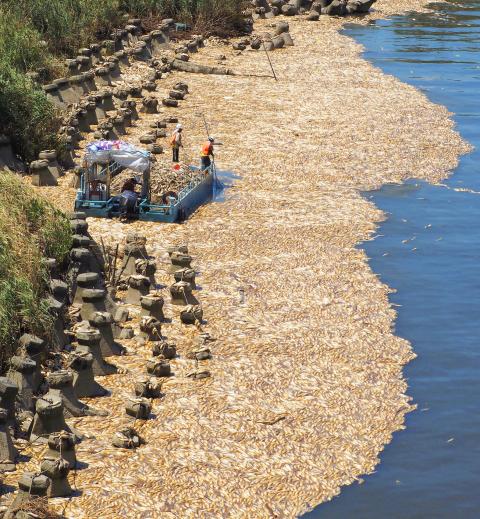Large numbers of dead fish have washed up on the shores of the Keelung River from Zhongshan Bridge to Dazhi Bridge, probably because of consecutive days of high temperatures, the Taipei City Government said.
The city government said it expected to finish clearing the dead fish from the river today.
The Taipei Environmental Protection Bureau said that the amount of dissolved oxygen in the water near the dead fish was 3.5 milligrams per liter, which is about four to five times lower than normal.

Photo: EPA
The water temperature was 30.3oC, far higher than the average high temperature of 28.1oC in recent years, the bureau said.
The pH of the river was 7.3 which is normal, the bureau said, adding that despite the mass fish deaths the tilapia population in the river was alive and well.
“We suspect that the cause of mass death in fish is not due to contamination, but high temperatures,” the bureau said.
The bureau said it set up netting and floating blocks near the Bailing and Zhongshan bridges to prevent the dead fish washing downriver and was working with the Water Resources Agency to remove the dead fish.
The bureau said it could not give an accurate estimate on the total number of fish killed.
The bureau said that similar incidents have occurred in Yilan County’s Dongshan River (冬山河), Taoyuan’s Laojie Creek (老街溪), the Bitan area (碧潭) in New Taipei City’s Xindian District (新店) and in Xizhi District (汐止).
Taipei Public Works Department official Yu Pai-sung (游百崧) said that the greatest concentration of dead fish was near a river junction.
The department yesterday sent out three boats to help clear the fish, and at least one returned before noon fully laden, Yu said.
The department sent out an additional two boats yesterday afternoon to expedite the operation, Yu said.

Taiwanese can file complaints with the Tourism Administration to report travel agencies if their activities caused termination of a person’s citizenship, Mainland Affairs Council Minister Chiu Chui-cheng (邱垂正) said yesterday, after a podcaster highlighted a case in which a person’s citizenship was canceled for receiving a single-use Chinese passport to enter Russia. The council is aware of incidents in which people who signed up through Chinese travel agencies for tours of Russia were told they could obtain Russian visas and fast-track border clearance, Chiu told reporters on the sidelines of an event in Taipei. However, the travel agencies actually applied

Japanese footwear brand Onitsuka Tiger today issued a public apology and said it has suspended an employee amid allegations that the staff member discriminated against a Vietnamese customer at its Taipei 101 store. Posting on the social media platform Threads yesterday, a user said that an employee at the store said that “those shoes are very expensive” when her friend, who is a migrant worker from Vietnam, asked for assistance. The employee then ignored her until she asked again, to which she replied: "We don't have a size 37." The post had amassed nearly 26,000 likes and 916 comments as of this

New measures aimed at making Taiwan more attractive to foreign professionals came into effect this month, the National Development Council said yesterday. Among the changes, international students at Taiwanese universities would be able to work in Taiwan without a work permit in the two years after they graduate, explainer materials provided by the council said. In addition, foreign nationals who graduated from one of the world’s top 200 universities within the past five years can also apply for a two-year open work permit. Previously, those graduates would have needed to apply for a work permit using point-based criteria or have a Taiwanese company

The Shilin District Prosecutors’ Office yesterday indicted two Taiwanese and issued a wanted notice for Pete Liu (劉作虎), founder of Shenzhen-based smartphone manufacturer OnePlus Technology Co (萬普拉斯科技), for allegedly contravening the Act Governing Relations Between the People of the Taiwan Area and the Mainland Area (臺灣地區與大陸地區人民關係條例) by poaching 70 engineers in Taiwan. Liu allegedly traveled to Taiwan at the end of 2014 and met with a Taiwanese man surnamed Lin (林) to discuss establishing a mobile software research and development (R&D) team in Taiwan, prosecutors said. Without approval from the government, Lin, following Liu’s instructions, recruited more than 70 software